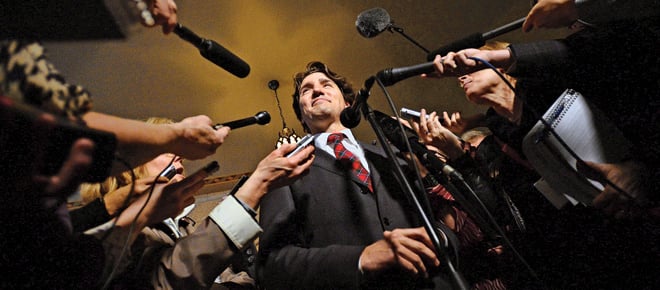Why Harper’s foes need to get off the pot
Paul Wells explains why Stephen Harper’s opponents always underestimate the PM
Sean Kilpatrick / CP
Share

Hey, did you hear Justin Trudeau smoked marijuana? I think it was in the news somewhere. The Liberal leader was asked whether he had taken a puff, and he answered at some length, at one point admitting that he had gotten high at a dinner party three years ago, after his election as a member of Parliament. After that, the press gallery went into one of our periodic frenzies, asking every adult who slowed down long enough to scrum whether they had ever used marijuana. Turns out many have. (But not Stephen Harper!)
While we were busy sniffing out used roaches in Centre Block restrooms, a debate over the propriety of smoking pot ensued. Peter MacKay, newly ensconced as justice minister, said Trudeau demonstrated “a profound lack of judgment” and set a “poor example for all Canadians, particularly young ones.”
There’s something to that. Prolonged marijuana abuse has been linked to memory loss, although of course it’s always hard to prove a direct causal link. For instance, in 2003 MacKay signed a pledge not to merge the Progressive Conservative Party with the Canadian Alliance. He forgot the promise almost immediately. But it would be unfair to blame pot.
Soon enough it became easy to find Liberals who would patiently explain, off the record, that Trudeau’s pot confession was part of a strategy to “brand” the Liberal as a “new kind” of “straight-talking” leader who would “not beat around the bush” but would instead “tell it like it is” because he’s “auditioning for a remake of The Mod Squad, which is the only possible explanation for this sudden outburst of 40-year-old slang.” Okay, I made the last part up. It was equally easy to find other Liberals who would explain that, by declining to hotbox the Langevin Block, Harper was coming across as a boring fuddy-duddy who did not understand the way things work nowadays.
Liberals, you see, are quite sure every Canadian is a Liberal whose vote was stolen by Conservative skullduggery in the elections of 2006, 2008 and 2011. Canadians, in this view, think marijuana use is harmless fun, and they will blame politicians who want to harsh the national buzz. So a Liberal friend of mine was genuinely surprised when she plunked herself down behind the Liberal party table at a local community event and got her ear bent by voters, many of them from immigrant communities, asking why Trudeau was soft on drugs.
The realization that many Canadians believe illegal drugs should stay illegal is one surprise awaiting the Liberals. Another is that a lot more Canadians have complex, conflicting or frankly hypocritical views on drug policy— but that it’s not drug policy that will determine their next vote. Millions will vote based on their best guess about which party will best ensure a strong economy whose bounties improve their own life and their family’s. And Justin Trudeau just spent a month talking about something else.
This is something else that Liberals cannot understand: the notion that most Canadians are no longer properly grateful for the work Jean Chrétien and Paul Martin did to clean up deficits in the 1990s. In fact, a growing number of Canadians, even the ones who don’t smoke a lot of pot, have dim memories of the 1990s or none at all.
This helps explain a Harris-Decima poll from the end of August that inquired about respondents’ opinions of the national political parties. Trudeau’s net favourable impression is way higher than Harper’s and a fair bit higher than NDP Leader Tom Mulcair’s. Respondents were likelier to believe Trudeau “shares your values.” He’s having a strong year in the polls. But Harper still has a slight edge over both Trudeau and Mulcair on “judgment,” and on “economic management” it was a blowout: 39 per cent prefer Harper to only 20 per cent for Trudeau and 15 per cent for Mulcair.
Trudeau hasn’t the faintest intention of campaigning in the 2015 election with pot legalization as his main plank. But changing deep-seated attitudes toward a party takes time. And because the Liberals took two years to pick a leader after the 2011 elections, Trudeau only has three summers to define himself before facing voters, and he pretty much just blew one.
For much the same reason, I’m not sure Tom Mulcair picked the right issue when he used part of his summer to travel coast-to-coast campaigning for Senate abolition. For reasons explained elsewhere in this issue, Canadians are angry at the Senate right now. That’s not the same as believing any party has the ability, once in power, to do much about it. His Senate tour illustrates a little-noticed difference between Mulcair and his predecessor Jack Layton. Layton came from Toronto city politics. He hadn’t the faintest interest in constitutional tinkering. The NDP stood for abolishing the Senate, as it always had, and Layton never talked about it. Mulcair comes from Quebec provincial politics, where a generation grew up believing that if you have no constitutional scheme to peddle you cannot be serious.
Layton’s prosaic fascination with voters’ kitchen-table preoccupations helped him supplant the Liberals as the first choice for voters eager to block the Conservatives. Next time around that vote will be up for grabs again. Mulcair and Trudeau both plan to try to take Harper’s economic credibility away from him. They haven’t gotten around to it yet, but they believe they have time. Harper’s opponents always believe they have plenty of time.
On the web: For more Paul Wells, visit his blog at macleans.ca/inklesswells